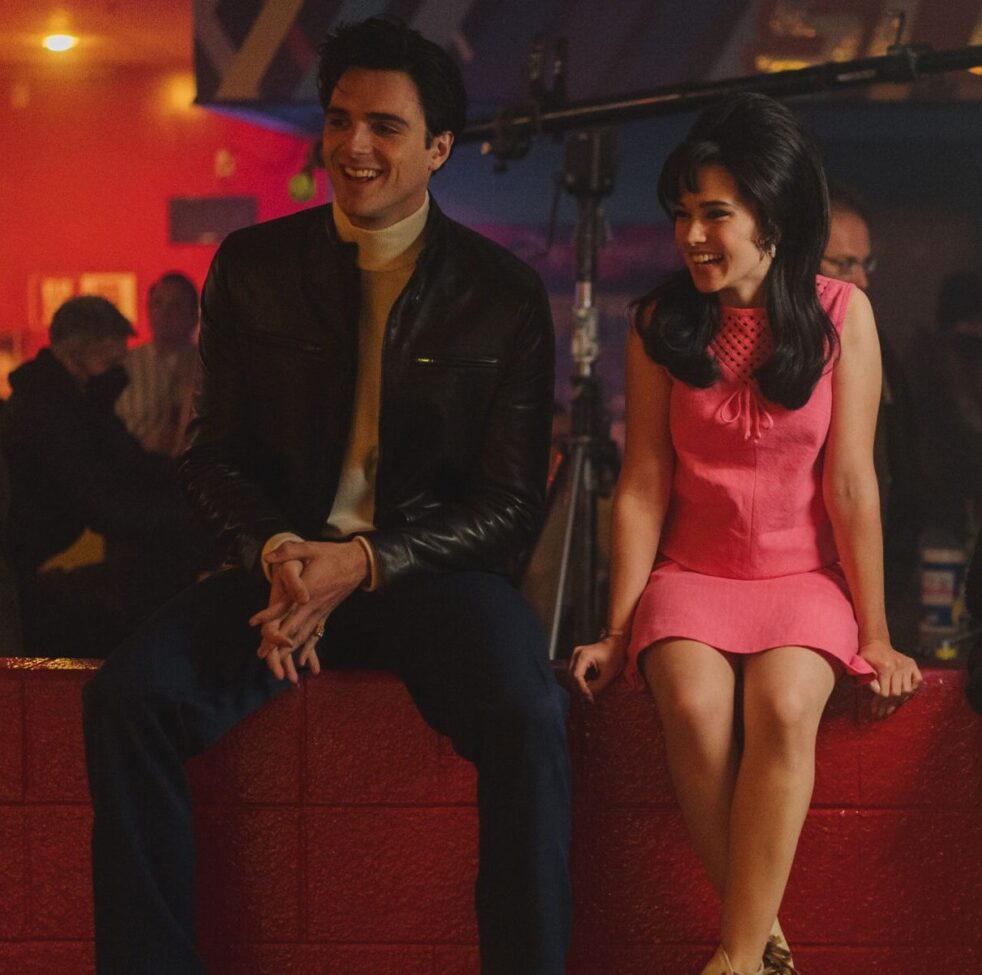“Priscilla” begins like any other fairy tale.
“You like Elvis Presley?” a young soldier asks 14-year-old Priscilla Beaulieu in a diner. Her sheepish smile betrays her answer. “Of course,” she says. “Who doesn’t?” Before long, Priscilla is whisked away to meet “The King,” and when her eyes lock with his, it seems like all her dreams and fantasies are coming true. Cinderella has just arrived at the royal ball.
However, the fairy tale veneer quickly fades. Director Sofia Coppola tells a melancholic story of disenchantment in “Priscilla,” adapting Priscilla Presley’s book “Elvis and Me” into a beautiful but flawed film chronicling the pair’s short relationship.
Coppola’s film calls to mind last year’s very successful “Elvis,” which had a massive $300 million box office return. While “Elvis” felt almost hyperactive in its screenplay, “Priscilla” is deliberate and subtle, creating an atmosphere that will not net Coppola “Elvis”-level financial returns but contributes to creating a far better film.
In that understated atmosphere, Priscilla’s euphoric fantasy slips into cold reality almost imperceptibly. On an army base in Germany, where Priscilla and Elvis meet, their time together seems impossibly romantic to Priscilla’s 14-year-old mind. He takes her to movies, tells her about his mother and bonds with her over their mutual homesickness. Yet, when Elvis’ deployment ends, he seemingly forgets about her, leaving Priscilla heartbroken. Until, of course, a call comes to the house asking if Priscilla would like to stay with Elvis in Tennessee, beginning a cycle of acceptance and rejection that would grow to define their whole relationship.
Back at Graceland, Elvis takes Priscilla shopping for dresses, buys her a puppy and enrolls her in school. All the while, though, Elvis remains just out of reach. When they are together, Elvis’ absurdly sophomoric friends, who would probably feel more at home in “Barbie’s” Mojo Dojo Casa House than in Graceland, surround them. However, Elvis is often away in Hollywood for weeks at a time.
Intimacy, too, always feels just out of Priscilla’s grasp. Elvis refuses to consummate their relationship until they are married because, as he tells Priscilla, sex is “sacred.” Every time Priscilla picks up a tabloid, though, there is a new Hollywood starlet allegedly getting quite a bit of sacred time with Elvis. With every salacious rumor, Elvis’ insistence on chastity begins to feel more and more like cruelty instead.
Eventually, cruelty becomes the norm. Elvis openly flirts with other women in front of Priscilla, and when he does not ignore her entirely, he can only muster criticism or anger. The pair has moments of happiness, but those moments are surrounded by seasons of deep disconnection.
Coppola, as usual, directs the film excellently. It looks gorgeous, is paced well and is marked by her excellent grasp of tone. Just through one shot and a needle drop, Coppola can evoke a more powerful, bittersweet tone than any director working today. Her warm impressionism is absolutely enchanting, as she says more with her camera and lighting than with words. She can make her audience feel deeply through just her visuals, as she has done magically throughout her career.
She also chronicles Elvis’ decline well, bolstered by a fantastic performance from Jacob Elordi, known to most for “Euphoria.” The audience watches Elvis aimlessly scrounge for a sense of meaning, leaving him broken and gradually more disinterested in Priscilla. Elordi does an excellent job portraying the subtle changes in Elvis’ behavior, resisting the campiness of Austin Butler’s Elvis performance from last year. It is especially compelling given that it is all seen from Priscilla’s perspective, providing an intriguing disconnection between the audience and Elvis.
That disconnection is the throughline of the film, and it gives the movie a pathos that is, at times, heartbreaking. It can also make the film feel aloof, shying away from exploring Elvis and Priscilla’s private emotions. We know pain, loss, loneliness and isolation must haunt the couple, but Coppola’s script never really shows those deeper places. Instead, viewers are left guessing.
Cailee Spaeny gives an excellent performance as Priscilla, and she gives definition to a character with relatively little dialogue. She does an amazing job at playing Priscilla completely believably from age 14 to 30, and she has great chemistry with Elordi. However, through no fault of Spaeny — the audience is locked out of her feelings. Certainly, the disconnection helps viewers experience the distance in Elvis and Priscilla’s relationship, but it also removes them from some of the soul of the movie too. Coppola has always operated at a distance from her characters, but in “Priscilla,” this removal limits the audience to only a surface understanding of the relationship at the heart of the movie. Viewers do not grow to understand the characters better by the end, à la Coppola’s film “Lost in Translation.” In “Priscilla,” the audience simply watches them interact in vignettes that feel increasingly detached as the movie goes on. By the time the relationship inevitably ends, the audience does not understand enough about Priscilla to even know what sparked the final decision. It feels less like a realistic divorce and more like Coppola hit her runtime limit.
These issues do not make “Priscilla” a bad film, though. It is still quite moving, and it is impossible not to be enraptured by the pure quality of the directing and performances. Coppola has crafted a powerful story worth watching. It is no fairy tale, but it would be a lie to say the movie does not have a little bit of magic.
